#Dracula should have remained a villain
Explore tagged Tumblr posts
Text
The biggest mistake netflixvania made was giving Dracula a happy ending.
Yes, it's nice and satisfying for the immediate audience but it completely fucks up everything else. You can't give the main, ultimate villain an ending where they give up evil and then go and keep telling the story where they were supposed to be the root of everything. It'd be like giving Ganondorf a nice happy ending in an Ocarina adaptation and then go on to tell Wind Waker.
Dracula is supposed to be an ever looming evil. His character in the first two seasons was excellent! The confrontation between him and the heroes is how he should be, powerful and driven by understandable emotions but ultimately a festering wound of hatred and grief that needs to be stopped. But he's also supposed to be the embodiment of evil in the sense evil is his lifeblood, unable to truly die as long as humans continue to be evil, but there will always be Belmonts to stop him. And when there are no Belmonts, heroes like Shanoa, the Morris', Hector, Maria, and Alucard will be there.
But without him, it robs these character of a major part of their story. What makes Julius special if Dracula is already killed off permanently? What personal element does Alucard have to the conflict any more? They have to dance around it and it weakens the overall story.
They want to keep adapting the series called Akumajō Dracula, but without Dracula.
#castlevania#vlad dracula tepes#castlevania netflix#dracula#netflix#lisa tepes#castlevania hot take#listen i get it#its a nice ending#but its worse for the story as a whole#Dracula should have remained a villain#they should have built on his sadness and anger#it would have been so compelling#and so painful to watch#but in a way that keeps you glued to the screen#i feel they just shot themselves in the foot here
45 notes
·
View notes
Text

My mom gave me this chocolate London kit for Christmas and I finally decided to use it as sort of a tongue-in-cheek Fourth of July activity. I love my mom and I don’t think she meant to psychologically torture me, but this experience lowkey led me down a true long dark night of the soul and then utterly broke me. Follow my slow mental unraveling below.
I should add that I am bad at crafts and once got gorilla glue all over my hands while fixing a child’s display-only gingerbread house and spent Christmas break with a hard translucent shell on both hands gradually flaking off over the course of a week, so a fair amount of this may be user error. But also the box says this is for ages 6+ and I’m over 5 times that, so maybe they could have done a wee bit more handholding.
Anyway, here’s my journey, which should absolutely be read in the tone of Jonathan Harker’s letters in the beginning of Dracula.
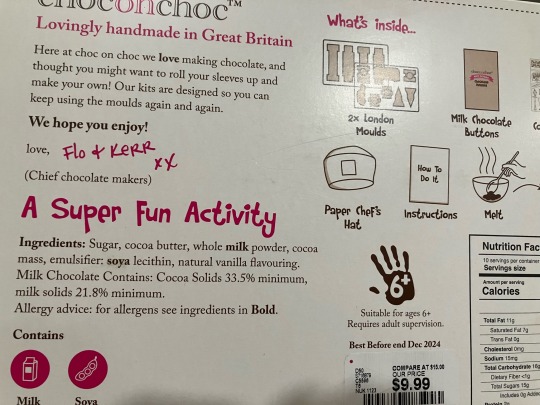
The first hint that something was wrong happened when I melted the chocolate according to instructions and the next step said to pour it into the molds. The chocolate was not really the “pouring” kind. It was a chunky sort of paste that I had to spoon in. The molds filled unevenly and clumpily and at this point, I asked my husband if he’d let me try to assemble the rest of this on my own because I think I can tolerate my failure better if nobody else witnesses it.
The instructions also cavalierly said to save a “handful” to use as mortar for the chocolate tower.
How much is a handful? A Schmergo-sized hand or a husband-sized hand or what? I have very small hands for an adult, but this is for ages 6+ after all. I opted for a Schmergo-sized handful. I would live to regret that.
I chilled the pieces in the fridge for 20 minutes as directed, then popped them out of their mold. To my surprise, they actually didn’t look THAT bad.

Looking at the pieces of Big Ben that I had to assemble, I became acutely aware that there weren’t detailed instructions on how to fit them together other than just “put them together” and no actual photographs of a real person doing it. The wall pieces were still unnervingly floppy and I decided to freeze them in hopes of hardening them while I focused on the clock itself.

In addition to Big Ben, the kit came with a chocolate taxi and a chocolate double-decker bus. The taxi popped out slightly distorted but in a way I liked, with playful Toontown vibes. But the double-decker bus was still mushy and fudgelike, warping and rippling alarmingly as I tried to push it out of the mold. I opted to put it in the freezer, too, along with the walls of Big Ben.

The instructions said to use the melted remaining chocolate to stick the pieces together and to apply it by sticking my finger in it and rubbing it on. It did not mention that, even after letting the chocolate cool, the warm melted chocolate would make the details of the pieces of the chocolate you’re sticking together start to melt, too.
I began to wonder if this kit had ever been formally tested by anyone and if the instructions were written by AI, like that Google search result that suggests adding Elmer’s glue to your shredded cheese when making pizza to keep it from sliding off.

Nothing can prepare you for how bad the clock part looked, so I’m just going to let you deal with it cold turkey. Et voila.
As I cemented my terrible melted clock together, it occurred to me that I’d have a lot more fun if I really leaned into the ominous post-apocalyptic energy of the abomination before me.
What if this was the result of some kind of whimsical Doctor Who villain— or maybe The Unknown from that infamously bad immersive Willy Wonka experience— transforming major London landmarks into chocolate… during a heat wave?
How will will the new Prime Minister Keir Starmer deal with this on his first day in office?
I yelled to my husband in the adjacent room, “Maybe I’m just turning into the Joker, but this is starting to feel more funny than depressing!”
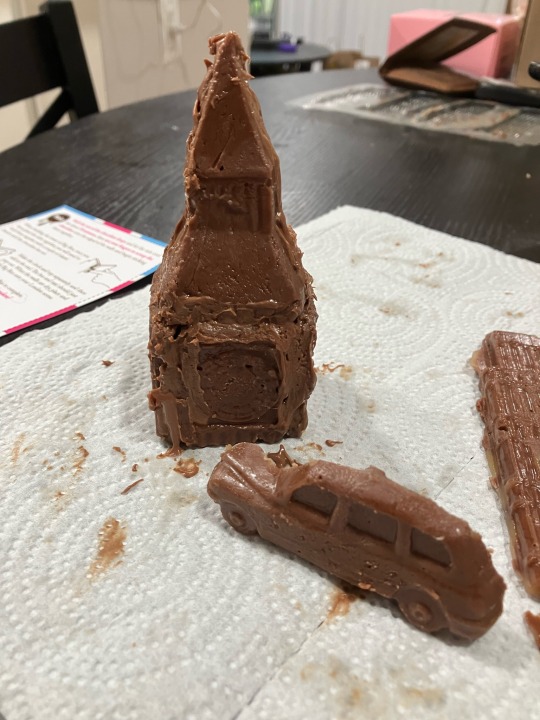
“Mr. Starmer, a second chocolate vehicle has hit Big Ben.”
The bus actually came out pretty well!
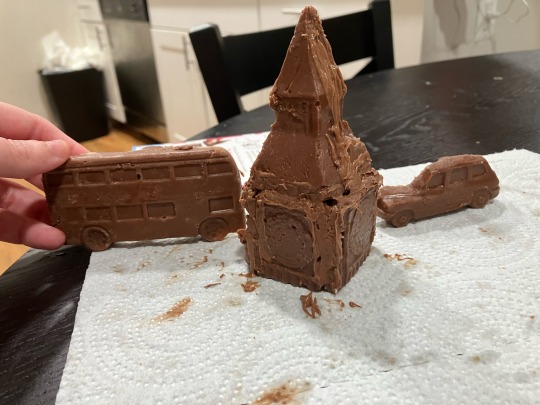
Trying to fit together the pieces of the walls would have been maddening if I hadn’t already been driven mad by the clock portion. The pieces didn’t actually fit together quite right, they were still slightly floppy, and the instructions said— after I was in blood stepped so far that should I wade no more, returning were as tedious as go o’er— that I was supposed to use ELASTIC BANDS to hold together the tower walls while the chocolate was cooling.
The kit didn’t come with elastic bands and I don’t have any in my house except for scrunchies with my gross hair stuck to them, and I’d already come this far, so I decided to forge onward. Then a piece snapped off.
Honestly, this rules, no notes:
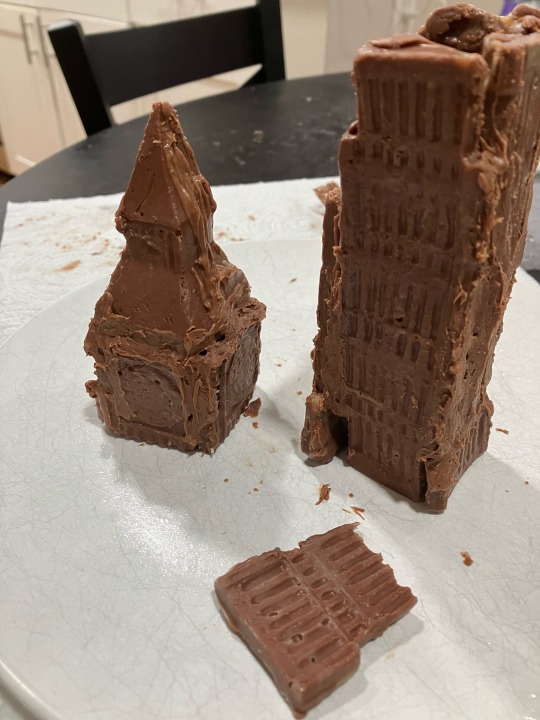
I did it, but at what cost? I don’t know much about British politics, but this feels like a poignant commentary on the current state of affairs or something. Should I submit this to the Tate Modern?
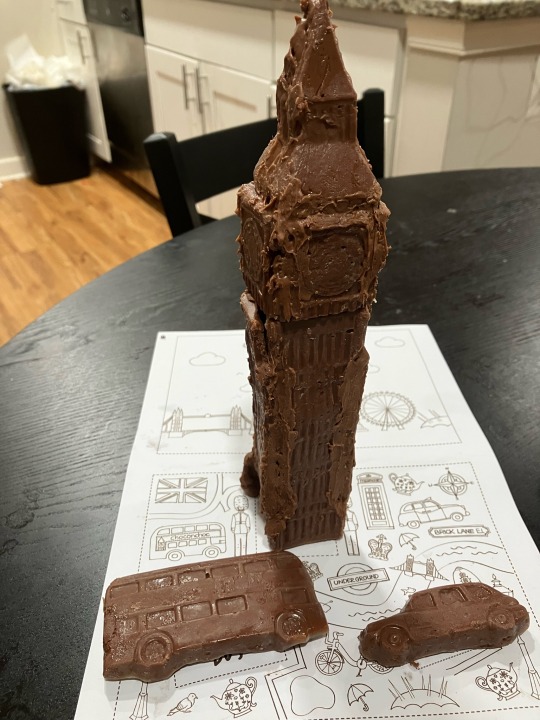
77 notes
·
View notes
Text




@hypermascbishounen hope you don't mind if I save these comments because you explained very well one of the core, yet subtle issues with NFCV
I'm thinking now of all the interpersonal conflicts in NFCV; and they're all... lacking.
Dracula vs. the Church: the Bishop dies at the end of Blue Fangs. Indirectly, Dracula got his revenge, but obviously this amounts to little since Dracula is furious at mankind and the Bishop was ultimately small potatoes.
Trevor vs. Alucard: the idea is that they're rivals and foils in true CV fashion. The reality is that Alucard is a dry cunt to Trevor for petty reasons like "wah the vampire hunters hunt vampires :(" or "I'm insecure that I made the right choice :(". Anyway, this is resolved by the two fighting Dracula together, then Alucard is ditched until the end. Riveting.
Alucard vs. Dracula: as pointed out in the past, Alucard feels less heartbroken over having to kill his only remaining parent, and more displeased that the Science Man was pushed to be evil. I don't care if Dracula cries that he's killing his boy because we aren't even granted one flashback to flesh out their relationship.
Dracula vs. everyone: he's depressed and apathetic. If he doesn't give a shit, why should we?
Bonus: Dracula has no personal connection to the Belmonts. Trevor isn't even the one who kills him.
Hector vs. Isaac and Dracula: what relationship? They sit around calling him the R-slur, and he has no idea that they resent him so much. He himself only remembers Isaac exists when he needs him. Isaac has very little reason to hate Hector after Dracula's death, since Carmilla, Dracula and he did way more damage. (this makes their reconciliation in S4 hollow and forced)
Hector vs. Carmilla: unresolved. Lenore replaces her in S3, and Hector barely contributes to the final battle against Carmilla - he stays behind to coddle Lenore. Carmilla herself only sees Hector as a defective tool, and is barely concerned about him stalling.
Isaac vs. the Magician: who gives a shit? The Magician is nothing more than a deus ex machina to give Isaac what he wants.
Trepha vs. the cult that wants to resurrect Dracula: this one's a decent conflict, although the cult is more of an obstacle obviously.
Alucard vs. the twins: the relationship is superficially nice, but the betrayal comes so out of nowhere that it really feels like shock value. The indication that he would have fallen into misanthropy due to the trauma goes unresolved, he got better offscreen.
Hector vs. Lenore: as I said, Hector has no reason to oppose Lenore since he has no moral qualms about working for vampires and she would have given him what he wanted. She still tricks him for shock/humiliation purposes. The betrayal has no fallout whatsoever, the two become besties like nothing happened. Even Lenore's suicide comes out of nowhere, she expresses the desire with no gravitas, and he let her die with barely any torment.
Lenore vs. the Council: kind of? I am very generous in interpreting Lenore resorting to raping Hector because she feels insecure in her methods. She whines a lot about feeling sidelined in S4, but we see very little of it. Carmilla yells at her a bit, and she immediately spirals into "she lied to meeee :<". The two are actually excellent foils when it comes to their methods and objectives, but they don't butt heads about it.
Isaac vs. Carmilla: in theory they should have a personal reason to fight, since Carmilla was the one who eventually lead to Dracula's death. But the fight takes place after Isaac let go of Dracula, and is now simply playing hero stopping the villain from conquering the world. She, naturally, doesn't give a shit about him since the dude has the presence of a log in S2.
Trevor vs. Death: again, Death at this point is more of an obstacle than someone who matters personally to Trevor.
since you mentioned game Richter and his conflict with his family legacy: hey you know how Trevor has trauma over his family being killed when he was a kid because considered enemies of the Church? No? That's okay, the show didn't either, he finished his arc in S1 and that's it :D
To this, add another complaint I had, that friendships and romantic relationships are all banter (some of it even rather mean), no warmth.
It really is pathetic when compared to the gripping, interwoven relationships in the games. Juste and Maxim, Hector and Isaac, Shanoa and Albus, even Leon and Mathias for what little we see of them, they would all eat this for breakfast. The show pretends to be moved by characters, but honestly, it feels more moved by dialogue, which is very different.
(Nocturne is a little better. While Sun Thundercat is a pathetic villain and giving Richter the dead mom trauma is lazy as hell, at least we have more interpersonal conflicts: Richter vs. Olrox, Maria vs. the Abbot, Tera vs. Sun Thundercat, Annette vs. Vaublanc. The characters themselves are very paper thin, though)
26 notes
·
View notes
Text
Dracula in Storybrooke part 6
For Captain Swan Supernatural Summer @cssns
Once Upon A Time: Emma Swan/Killian Jones
Deep in the forest, a large tree was uprooted and thrown against another. Seconds later, large boulders were reduced to pebbles.
Drake was fuming at the latest turn of events. Never would he have guessed that the human rival for the savior's affections would hold the bloodline of the very beings that could destroy him.
“You don’t seem to be a vampire like the ones Dracula made.” Emma said softly, tracing her fingertips along Killian’s jaw.
They were laying in bed. Holding one another. Gazing at each other lovingly.
Yet another villain had tried to tear them apart. And had failed.
Without saying anything, they had mutually agreed to wait until daybreak to tell everyone about the latest development.
There was no real urgency anyway. Killian had shown he possessed a great amount of willpower.
Once he had consumed a small portion of Emma’s blood, his craving had been satisfied. There was no longer a terrible hunger, driving him to consume without thought or reason.
The only cravings that remained were the usual ones. Mostly, for his lips to be all over his beloved’s.
“I don’t think I’m completely a vampire any longer.” Killian said, trailing soft touches along Emma’s skin. “I felt another change happening to me after I consumed your blood. I am not sure what I am. But I feel more powerful than I did as a vampire.”
“Do you feel as powerful as you did as the Dark One?”
“It’s different. Wilder. But I still feel in complete control. The Dark One’s power felt like it was manipulating my mind. This makes me feel as though my senses and instincts are heightened. Almost like a wild animal.”
“You certainly made love like a wild animal.” Emma smirked. “But that’s not too unusual for you.”
“I never hear any complaints.” Killian growled playfully, causing Emma to squeal as he nibbled at her neck and made his way down.
They were soon too distracted by each other to worry about what was happening to Killian.
It was morning when they discovered more of what made Killian different.
Emma brought out Killian’s old leather duster, fearing that if the sun touched him, he would be turned to ash.
However, Killian’s instincts were not warning against him going out in daylight. Testing a theory, he stepped onto the porch and with his hand outstretched, moved into direct sunlight.
“Killian! What are you doing!” Emma screamed, before suddenly realizing…..
“You’re hand’s not burning?”
Killian looked at her with his signature sexy smirk. “It seems I won’t need my old coat after all. But I could still wear it, if you really wanted me to.”
“Maybe later.”
His smile turned delighted at her knowing look.
But playtime would have to wait. At the moment, they needed to get to Granny’s Diner and update everyone on what happened with Killian. And the multiple changes he had undergone.
Hidden in the shadows, Dracula watched with growing furry as the man he tried to enslave walked freely in the daylight, holding hands with the savior. Both with smiles on their faces as bright as the sun.
The vampire count had never felt jealousy as strong as he did in that moment. It made everything so much worse. A man he believed to be inferior to himself, ended up having an ancient bloodline that made him more powerful. A species that had driven the vampire count to hide in other lands. Forced him to start anew again and again. He had to pretend to be an ordinary man so as not to draw attention from the powerful and deadly race.
He had thought them extinct. He thought he was finally free. But he had made the fatal mistake and awakened the cursed bloodline in one of their descendants.
“So what exactly are you now?” Leroy squinted at Killian.
“I haven’t the slightest idea. All I know is that I feel powerful.”
“Do you have a strong craving for blood, or anything?” Henry asked, over the phone.
It had been mutually agreed that Henry should stay with Regina until Dracula was dealt with. Even Henry understood that Dracula could use him to get to Emma.
Similarly as he tried to use Killian.
“No strong cravings.” Killian assured the lad. “When I first was turned, I did have a strong craving for blood. But now I don’t feel a desire for anything.
He still felt desire for Emma, of course, but knew her boy would not want to know that.
“Score one for our side.” David sighed. He didn’t want to think about what might have happened if Dracula had succeeded in controlling Killian and taking Emma. Or worse, outright killing Killian.
Luck was on their side that Dracula had thought it the best strategy to use Killian, instead of killing his perceived rival. If luck remained on their side, maybe Dracula’s hubris would continue to be his downfall.
Now they all had to figure out exactly what Killian had become, and if it could help end Dracula for good.
Granny Lucus stepped to Killian and took a deep breath. “There’s something familiar about his scent. Animalistic. He smells like a predator.”
“Wouldn’t that be the vampire scent?” David asked.
“It’s different from the scent of the vampires.”
Emma couldn’t tell the difference in Killian’s scent. She had been as intimate with his scent as one could get and she hadn’t noticed any change. To her he just smelled like her Killian.
But since Granny Lucas was a wolf shifter herself, though her advanced age had dulled the primal instincts and behavior, her sense of smell was more keen than Emma’s.
“Is Killian a hybrid?!” Henry asked excitedly. “That would be so cool!”
“That is really weird.” Commented Leroy. “Who would have thought that a pirate had wolf shifter blood in him?”
“If it is wolf shifter, it’s not like the shifters from our world.” Granny said. “He smells too different to be like Ruby and I.”
“Couldn’t that just be the vampire blood changing the scent?” Emma asked.
“I would still smell the familiar wolf underneath.” Granny explained. “No, this is different. It smells more primal. More savage. Even my old worn out senses can detect it.”
Snow leaned toward her daughter and asked quietly, “Has he been more aggressive with you since he turned?”
“Not anymore than usual.”
Snow raised her eyebrows at Emma’s blissful smile. It was good to know that her love life was far from lacking. She deserved to be loved unconditionally and with great passion. It made a mother’s heart glad to know that her daughter was treated so well by the man she loved.
“Now we have another problem.” Leroy huffed. Not only do we need to get rid of Dracula, and reverse the vampire curse on everyone he turned, but now we have to fix whatever happened to the pirate.”
“When Dracula forced me to consume his blood, he said that whoever he turns is under his control.” Killian remembered the event. “I think the vampires are linked. If we take Dracula’s power away, his hold on them will end. And possibly the vampire curse.”
“Would that include you, too.” David asked.
Killian nodded. “Whatever has woken in me has a powerful drive to end Dracula. It’s like its existence is for the sole purpose of ridding the world of the being once and for all. I may have wanted to cut off his head, before, every time he tried to go after Emma, but now that desire has increased tenfold.”
Killian didn’t say it outloud, but killing Dracula was almost the only thing he could focus on. The way that cats have an instinct to chase mice or birds, that was the way it felt in regards to Dracula.
The only thing keeping him from going after the count that very moment, was that the man’s heart was stronger than the beast's instincts. Killian still had full control. And he needed to be sure that Emma and her family were safe. And well informed. They needed knowledge in order to defeat their villain.
One thing that he and the awakened beast inside him had in common was the insatiable need to destroy Dracula, and protect Emma.
His logic told him she was the key to everything, and now his instincts were screaming the same thing.
Killian wondered about fate. How he came to meet and fall in love with the woman an ancient monster would require to gain power. And how Killian carried the ancient heritage of the beings that could defeat that monster.
He kept extra close to Emma as the group used their new circumstances to plan a new form of attack.
Deep in the shadows, Dracula devised a new plan to get rid of his rival. And captivate the heart of the product of true love.
#emma swan#killian jones#once upon a time#captain swan#ouat#cssns23#cssns24#grimmswanfic#cs ff#cs fanfic
12 notes
·
View notes
Text
DNF: DC vs. Vampires: World War V


DC vs Vampires started off with a lot of potential (HUGE SPOILERS DISCUSSED FREELY AHEAD). A secret war against a vampire king, with some Justice League members already turned, heroes and villains alike being revealed? That's a good premise. The fact that they shook up the status quo halfway through was... odd, especially considering nothing felt resolved, but it was only halfway through, what else could there be?
A whole lot of nothing. The end of the original miniseries ends with the original vampire king, Dick Grayson (stupid twist) killed and replaced by Barbara Gordon.
I'm not against heroes being turned into villains in this series; I think that created a great deal of tension and uncertainty in the original series, and when all the sleeper agents were revealed we quickly learned how much our heroes were on the back foot. But a lot of the decisions characters made felt stupid and shortsighted, but worse than that, it didn't feel in-character, and nobody feels like even a fraction of their normal self.
The rules of this world's vampires are terribly inconsistent. The first issue of the original series suggests that a vampire king is forcing the newly-fledged vampires under his thrall, so normally-heroic or self-serving vampires pledge themselves to his dark cause. But when the vampire king is revealed as Dick Grayson, you start to question: why is this happening? There's a backup story that goes into his origin but it doesn't fully explain why the heroic Dick Grayson has turned to world conquest, and such a drastic character change should be in the story proper.
So you would think that being turned into vampires makes you just straight-up evil, right? Something like Buffy the Vampire Slayer where it's not you as a vampire, it's a demon controlling your body; that worked for DCeased so this could potentially still be quite fun. But no. Multiple times we're shown that vampires retain the personality, memories and emotions they had when they were alive; Damian Wayne remains a thorn in Barbara Gordon the vampire queen (she kills and replaced Dick Grayson, because... reasons) as he remains fully himself, and Andrew Bennett AKA I, Vampire was human-enough for years. There's little rhyme or reason to which characters get to be evil versions of themselves and which get to be bullies; multiple stories with Wonder Woman try to have it both ways and end up making her character inconsistent.
That's the great failing of this series: its terrible grasp of character. Side stories by other authors will attempt to justify decisions in the main book with other explorations of an emergent vampire society, and may even succeed on occasion, but the main story remains frustratingly vague, inconsistent and shallow. Even humans aren't safe from this! Why does Barbara Gordon replace Dick Grayson, even when she was human? It's stupid, is what it is.
There are glimmers of good character writing here and there; Alfred has never been badly-written a day in his life, and Guy Gardner gets some time to shine in DC vs. Vampire: World War V: Darkness and Light, but in that same issue there's a story about Harper Row that I absolutely hated and ends with a tearful Wonder Woman wondering if some people were just too pure for this rotten world.
Fuck that noise. I wanted DC vampires, and I sometimes got that, but more often than not I got a corpse wearing a costume. You could've done something interesting with this series, as former heroes and villains alike cope with their changes and try to figure out how much of their humanity to retain. This series wants what happened in Batman & Dracula without putting in the work that would turn the heroic and horrified Batman into a monster by the end. It is shallow and shocking for shock's sake and depressing and so, so bleak, and worst of all it's a slog to read and there's little redeeming quality to it. I've read a good majority of this and I'm done; if it does something absolutely wild and fascinating maybe I'll jump back in, but I've lost trust it'll ever be good.
2 notes
·
View notes
Note
4. What fandom’s/ship’s fan fiction do you read the most?
6. What’s the last thing you read that made you laugh?
17. Describe a fic that is still in the ‘ideas’ stage.
19. What’s your favorite character headcanon? (Could you do this for Claudine or either of the Hook siblings, please?)
4. Descendants and Coco, with Warrior Cats and Encanto a close second.
6. This one part in Dracula, when Mina's writing in her diary "I wonder where Jonathan is and if he is thinking of me!" And considering this came just a couple of chapters after Jonathan's journal, where every other page he's mentioning Mina and how he longs to see her again and what she would say and how she gives him hope etc etc....I just found it funny.
17. A fic inspired by Never Again by RubyofRaven. The basic premise of Never Again is that no villain is allowed to have more than one child on the Isle; as soon as a second (or third, or fourth...up to however many children a villain has) child is born, the first child is taken off the Isle and brought to Auradon.
The Isle doesn't know that, though. They have no idea what happens to the children who are taken away.
So, for example, CJ Hook is growing up on the Isle and never met her two older siblings.
But this applies to all kids on the Isle. None of them knew their older siblings. They all know that if they ever have a younger sibling, they will be taken away forever.
But, and this is what my fanfiction will be about....what about Mal and Hadie?
They are siblings. Half siblings? Full siblings? Older? Younger? They don't know, and they don't say, and they don't dare ask, for as soon as anyone finds out they're siblings, one of them will be taken away, never to be seen again.
19. Character headcanon for Claudine: She has pyrophobia, for obvious reasons. But she also absolutely adores small children. I have no idea if this is a fandom-accepted headcanon or just one that only I've thought of. Oh well.
Character headcanon for the Hooks: The thing is, there are very few groups of siblings on the Isle. There are many only children, a few pairs of siblings or cousins, but the Hooks are the only set of three siblings on the Isle aside from the Gaston twins and Gil, and an indeterminate amount of Tremaines.
So why don't they stick together? Why don't they form their own crew, instead of splitting up?
The thing is, each of the Hooks had a deep-rooted fear of abandonment, of betrayal, of being left alone. This is especially, especially prevalent in CJ, but the others have it as well, and to no small extent too.
Maybe it's because their mother left them to be raised by Hook. Maybe it's just a natural insecurity. But, regardless, it is what it is.
The Hooks look around at the Isle, and what do they see? They see no set of siblings being united.
They see Mal and Hadie who refuse to acknowledge that the other is kin to them.
They see the Gaston twins, who despise their younger brother as a weakling.
They see Zevon, who joined CJ in her attempted takeover of Auradon, and Yzla, who joined the Anti-Heroes club.
No set of siblings is united. No set of siblings is together.
If that's what it's like for every set of siblings they know, why should they be any different?
And so they split up. They do not verbalize it; perhaps they are not even conscious of it. But they do not trust themselves and each other to remain together for long.
And this doesn't just apply to each other. The fear of abandonment applies to every friendship, every alliance, they form.
If I'm the captain, and I'm a good captain, and I take care of everybody and I lead them well, than no one would ever want to betray me, right?
If I'm the first mate, and I'm a good first mate, and I do absolutely everything my captain says, then I'll always get to be the first mate, I'll always have my crew, because they won't have any reason not to like me, right?
If I don't have any crew at all, no friends allies or anything, except when I really really really need to, then no one can leave me because I won't be close to anyone in the first place, right?
Right?
Send me some fanfic asks!
#panthera-tigris-venenata#answered ask#descendants#the isle of the lost#disney descendants#hook siblings#harriet hook#harry hook#cj hook#mal descendants#hadie descendants#dracula#mina harker#jonathan harker#claudine frollo
23 notes
·
View notes
Text
You're not crazy; he looks like Vlad the Impaler because the costume designer was specifically taking inspiration from later 16th and 17th century noble fashion from the part of present-day Romania he was from, elements of which are shared by peoples from neighboring areas like Ukraine, Hungary, and Poland. Proximity to and sometimes actual control by the Ottoman Empire in the case of Ukraine, Hungary, and Romania strongly influenced fashion there during this time period, making styles more visually distinct from what you think of when you look at noble fashion farther away in Western Europe from the same time period. I know Vlad the Impaler was pre-16th century, but there's a direct line of development from the fashion of his time into fashion that became popular a couple centuries later as Ottoman influence on fashion continued to grow and trading opportunities expanded up through the Balkans and Black Sea and beyond to the countries directly next to those areas. (The huge mustache remained popular as well.)
If you think of culture as moving in gradients, and you center your story around characters living in England (Dracula) or Germany (Nosferatu) in the past, you can pick a villain from another culture in this border region where the gradient shifts a bit--Hungary, Romania, Ukraine, etc.--somewhere far away enough to be at once familiar while still being unfamiliar enough to invoke deep-level anxieties about foreigners. The parallels to the reception and persecution of Jews in Europe--many of whose ancestors were brought there as slaves or forcibly deported from their homeland in Israel by Roman imperialism and repression--as 'perpetual foreigners' in the countries their communities survived and evolved in are obvious.
Because of the nature of the vampire myth, what it represents on a deeper psychological level, and how it's localized to this part of Europe in the movie and popular culture, I 100% understand if there are some Jewish and Ukrainian viewers (or others) who watch the movie and are reminded of how other peoples in history and/or the present time have stereotyped and persecuted them, regardless of what the filmmakers intended or if I necessarily agree that it's 'meant' to show/be something. Art is a personal experience.
Anyway, here's a costume designed for the new Nosferatu!
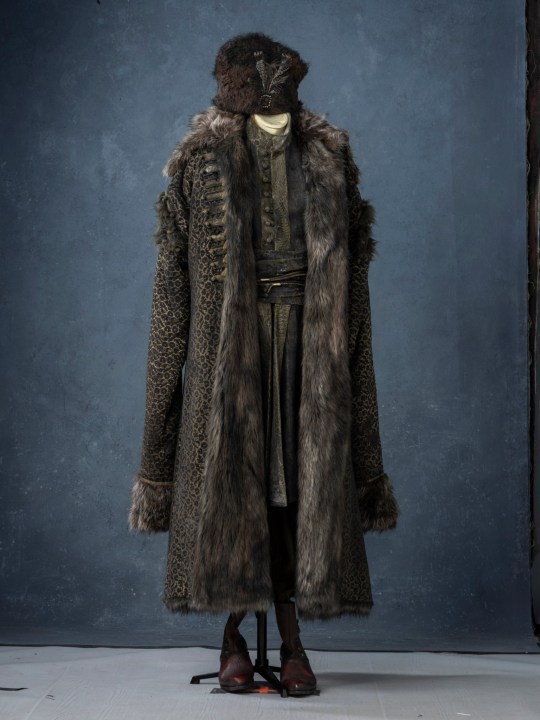
You can see the similarities it has with this drawing of a 17th century Polish nobleman and the portrait of Gábor Bethlen, a Hungarian prince of Transylvania from the same time period. Note the elements of the coat--lined with fur inside, the decorative designs on the front, the super long sleeves hanging over the shoulder that aren't actually meant for your arms, etc. The hats all have a jeweled ornament decorated with feathers, and the inner jackets are wrapped with sashes at the waist. (We actually have the correspondence of a Transylvanian nobleman who ordered two sashes custom made in Constantinople, but there were issues with his order which I'll explain in the tags.)
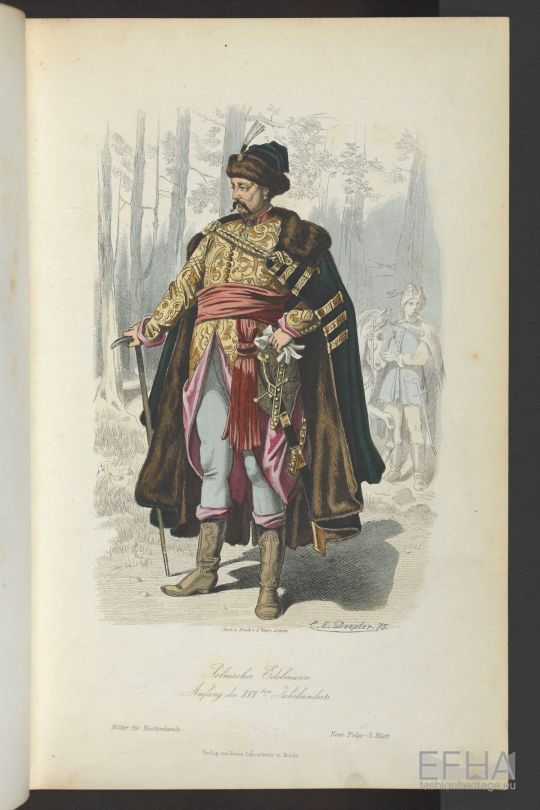
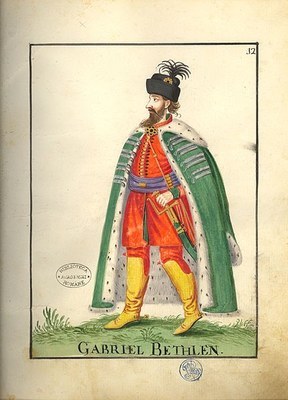
Some more 16th and 17th examples drawn from contemporary Hungarian illustrations and paintings:
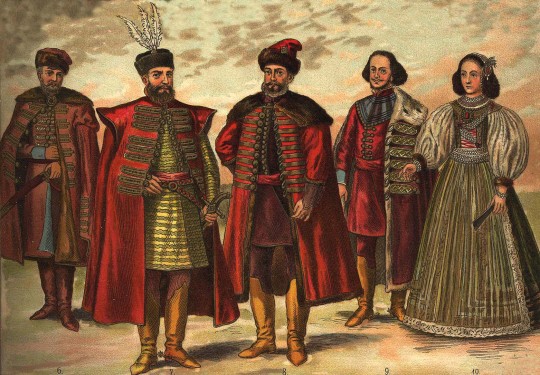
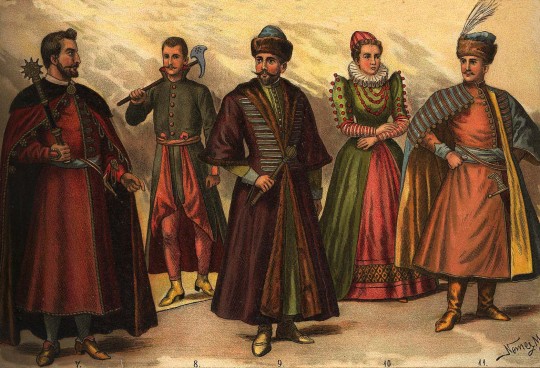
If you zoom in on the costume's coat, you'll see floral patterns created out of the negative space of surrounding gold embroidery. As a "similar" thing in terms of floral embroidery made of precious metal thread, we have Leopold I's dolmány, made in Italy but produced in Hungarian style. On the right is another example from the same time period of golden floral embroidery, which could be purchased directly in the Ottoman Empire and then further sewn or altered in Hungary/Wallachia/wherever.
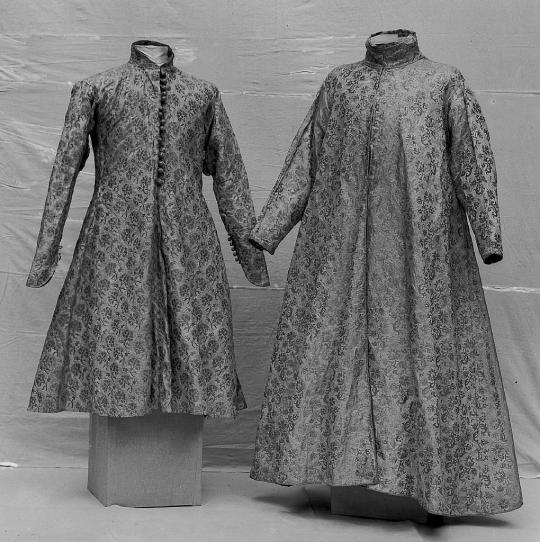
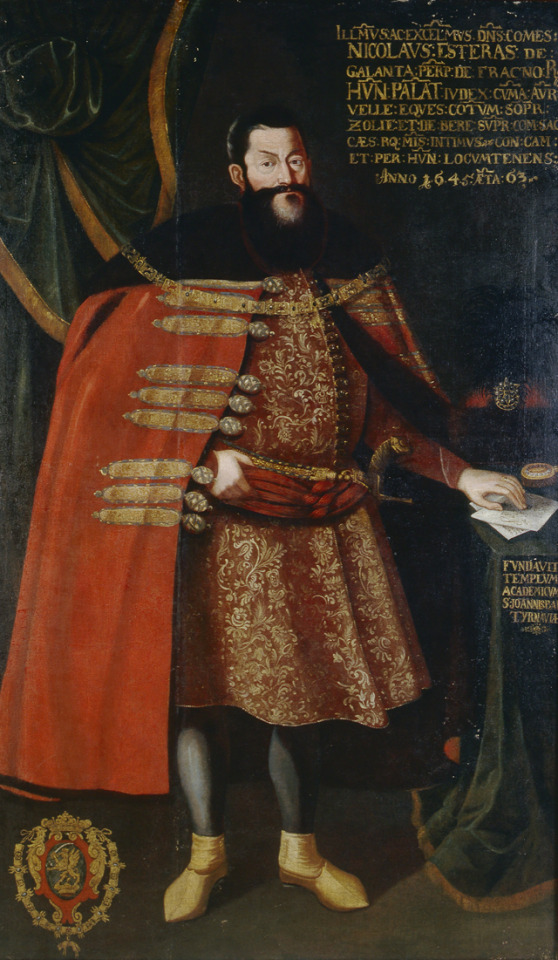
I know I just used one Polish example, but there's a ton of upper class male fashion from this time period that looks like this from there, Ukraine, the Balkans, etc. because that's the region where this stuff was popular. Obviously it should all be brought back immediately. This is why the movie costume looks like that--it's specific to a particular time and place, calling back to where Vlad the Impaler came from and where Bram Stoker got his general inspiration and vibes from, only a couple hundred years after Vlad actually lived.
“If it should be, and he came to London, with his teeming millions. … There may be a solemn duty; and if it come we must not shrink from it.”—Bram Stoker, Dracula
A vampire must avoid direct sunlight to avoid crumbling into ash, yet few folk horrors have been subject to more scrutiny than the transformative bloodsuckers who dominate the night. A new and absolutely terrific cinematic take on the myth, Robert Eggers’ Nosferatu, has hit theaters, and its most notable element, in addition to outstanding performances, dialogue, and production design, is that this new version really amps up the lusty goth quotient. (So much hallucinatory writhing and moaning!) However, its release so close to the inauguration of a U.S. president who has stoked fears of immigrants draws out xenophobic elements inherent to the text, and an inner tension with its own reactionary origin is part of the genius of this new film.
If you aren’t a subscriber to Fangoria magazine, you may not know the Nosferatu backstory. The first version, released in 1922, is a landmark of German filmmaking that plundered intellectual property as if it were the grave of a Victorian noblewoman buried with her jewels—a fate some of the characters in Dracula think has befallen poor Lucy Westenra, before it is revealed she is actually an accursed undead demon!
Unlike his most famous literary creation, though, Irish-born writer Bram Stoker does not walk the earth a century after his death. As such, the theater manager who wrote books on the side would likely be surprised at the strength of his legacy. Dracula, published in 1897, was only a modest success at the time. It was not even the first book about vampires published in English; how it became the wellspring for vampire iconography—to the point that is used to sell breakfast cereal—is perhaps due to vivid, dueling film interpretations.
In 1921, a German film producer with an interest in the occult created a new studio (Prana) with an eye toward making supernatural-themed films, and kicked things off with an adaptation of Dracula. He hired Henrik Galeen, who co-wrote the outstanding expressionist The Golem: How He Came Into the World, to write the screenplay, and F. W. Murnau—who would later make Sunrise: A Song of Two Humans, one of the undisputed masterpieces of silent cinema—to direct. But he did not pay for the rights to Bram Stoker’s book. Instead, Galeen changed the names of the characters (Count Dracula to Count Orlok) and the location (London to Wisborg, a fictional German city), and made some additional tweaks to the narrative. The title, Nosferatu, is a word used in Dracula to categorize vampires, meaning undead. (The etymology of this word remains debated, but it may have its roots in the Greek nosophoros, meaning “disease-bearing.”)
Nosferatu: A Symphony of Horror was released to significant acclaim, but one person who wasn’t happily chomping on popcorn was Florence Balcombe, Bram Stoker’s widow. An anonymous informant sent her a handbill from the movie’s lavish premiere at the Marble Hall of the Berlin Zoological Gardens. The promotional material boasted that the film was “freely adapted” from Dracula. Balcombe took this to court, won her case, and bankrupted Prana, which was ordered to destroy every copy of Nosferatu. Clearly, this did not happen, as you can still watch the movie today—and, despite the iffy ethical origins, you should; it’s terrific.
But what Balcombe did next was key. Springboarding off the increased interest in the story (and to guarantee proper payment on copyrighted material), she greenlit a stage production. The show ended up being a hit in London in 1927, then moved to New York later the same year. That version starred Bela Lugosi. Four years later, Lugosi reprised the role for Tod Browning’s film version for Universal Pictures, the first talkie in the Universal Monsters series. It was a sensation, and Lugosi’s sharp-toothed Transylvanian is now an early screen icon on par with Chaplin’s Little Tramp.
Other Dracula movies were soon in the works—a Spanish-language version was actually shot concurrently with Browning’s, using the same sets—and have never stopped. Hammer Studios in Britain made several classics starring Christopher Lee; there’s the Andy Warhol-presented Blood for Dracula; the disco era’s comedy Love at First Bite; Francis Ford Coppola’s stylistic version from the 1990s; and then there’s Adam Sandler’s Hotel Transylvania cartoons. Moreover, Lugosi knew a good gig when he saw it. The actor reprised his role for comedy (Abbott and Costello Meet Frankenstein—and also the Count!) and special appearances (a gig on Fred Allen’s top rated Texaco Star Theater radio show is just one example), and also starred in several Dracula-esque horror titles like The Devil Bat. While Lugosi’s lines from Dracula were instantly quotable (“I never drink … wine” is certainly my favorite), behind it all was the less hokey, dreamlike silent film version of Nosferatu, sprung from illicit origins and filled with striking sinister imagery.
Shadow of the Vampire, released in 2000, imagines that the original production was cursed because actor Max Schreck, who played Count Orlok, was truly a vampire. (Willem Dafoe was nominated for an Oscar for his performance of Schreck in this behind-the-scenes comedy, which is especially amusing because he plays the part of Prof. von Frantz, a spin on Stoker’s Dr. Van Helsing, in the new film.) Shadow of the Vampire’s premise—the cover up of an unsettling (fictional) aspect of the original Nosferatu—works because, while the intentions of Murnau and company are hard to know, it is easy to see how German audiences of the 1920s could read Nosferatu as antisemitic.
The film and its source material read like a laundry list of antisemitic tropes: The Count comes from “the East,” a backwards, superstitious land. (Transylvania, while certainly a real place, means “beyond the woods.”) He has somehow amassed a fortune despite living apart from the villagers who fear and despise him. He is a non-metaphorical bloodsucker. When he gets to civilization, he immediately starts preying on women. In most versions of the story, the first woman he assaults turns into a vampire herself, then starts draining the blood of babies and children, recalling the many examples of supposed blood libel used to excuse antisemitic violence throughout the previous centuries. When the character of Mina Harker (called Ellen Hutter in Nosferatu) is finally penetrated by the count, she declares that her blood is “unclean.” The Count’s curse demands that he sleep each night in the earth of his origin, but he comes up with a sneaky loophole by packing several coffins filled with Transylvanian dirt. One way to interpret the Count’s actions is metaphorical: The immigrants are unwilling to assimilate and they taint our family lines and drag their traditions along with them from the old country. But on a much more literal level, it is quite bluntly blut und bloden, blood and soil, a Nazi rallying cry since the 1920s that, unfortunately, persists to this day.
While these symbolic plot elements exist in the 1897 novel, it was the 1922 German film that dialed them up, adding some undeniable antisemitic visual tropes. Count Orlok, compared to the Spirit Halloween-ready Count Dracula, has a hooked nose and rodent-like clutching hands, an exaggerated reinterpretation of the Count’s features compared to how they are described in Stoker’s book. (Lugosi’s Dracula from 1931 eases up on the visual stereotypes considerably, but he does wear a six-pointed star the first time we see him.)
Murnau also added a plague element to Nosferatu’s storyline. When the Count’s ship comes to Wisborg, it arrives with rats and a rapidly spreading sickness. This “verminization” goes hand-in-hand with the notion of the “dirty Jew.” It is believed that Julius Streicher, editor-in-chief of the Nazi mouthpiece Der Stürmer, was a fan of the film, and Hitler himself, in Mein Kampf, compared Jews to vampires.
So hold on a second, you are telling me that a major motion picture studio has released a work of antisemitic propaganda, and it’s in theaters right now? Do I need to send an angry letter? No, not at all. Please do not cancel Robert Eggers, one of the more brilliant directors on the scene today, whose take on Nosferatu tamps down the antisemitism. (This is his fourth film, following The Witch, The Lighthouse, and The Northman, all very sharp plays on genre storytelling, and all worth watching.). Now, Count Orlok just has a weird and striking nose, not a hook nose. He is also less of a schemer. He is compelled to come to Wisborg, as if it is part of his burdensome curse. If one were to ask, “Why make this movie again?” I’d say that, apart from the exemplary sets and performances and cinematography, Eggers emboldens the supernatural, psychosexual connection between the Count and Ellen. Yes, the town leaders of Wisborg—ostensibly the heroes—remain understandably xenophobic. But Eggers adds a top layer of tragedy, by making the subtext text: The Count and Ellen should be able to get their telepathic freak on, but the social codes of the 1830s are so stifling that even the Prince of Darkness can’t fight them. This creates a tension to the story (and its anti-immigration strain) that feels entirely new.
Considering that hardly anyone watching the new Nosferatu will be unfamiliar with vampire tropes, Eggers is well within his rights to essentially copy-paste elements from the more problematic version and build on it. The added shading, leaving the audience wondering if maybe the Count isn’t such a villain, is enough nuance to keep this from feeling like a definitive political statement. After all, the first thing you’ll likely talk about after seeing it is Ellen’s (Lily-Rose Depp) several moments of bed-ridden, prurient murmuring “he’s coming!” from a dream-like haze. For a director who has made three sharp movies dealing with the supernatural or fantastic, this story is in Eggers’ blood.
10 Vampire Streaming Recommendations
Nosferatu: A Symphony of Horror (1922), dir. F.W. Murnau: The original nightmare.
Dracula (1931), dir. Tod Browning: The birth of a franchise. Warning: Though there are many classic moments, much of this movie is dull.
Dracula Has Risen from the Grave (1968), dir. Freddie Francis: The third Christopher Lee Dracula picture, and one that likely influenced the new one—as it was, for its time, a bit on the randy side.
Blacula (1972), dir. William Crain: An 18th century African prince is transformed into a vampire by Count Dracula himself, and ends up in 1970s Los Angeles. Released during the first wave of blaxploitation films, this was the first one to get supernatural.
Love at First Bite (1979), dir. Stan Dragoti: The Count comes to groovy New York and is faced with nonstop schtick. Richard Benjamin plays the famed vampire hunter Van Helsing’s grandson, a neurotic shrink named Dr. Jeffrey Rosenberg.
Nosferatu the Vampyre (1979), dir. Werner Herzog: Before Eggers, there was this German-language take focusing on Count Orlok. A slow-paced film that goes heavy on the plague storyline, featuring a substantial number of rats.
Bram Stoker’s Dracula (1992), dir. Francis Ford Coppola: Gen X Dracula, with Winona Ryder, Gary Oldman, and Keanu Reeves.
Thirst (2009), dir. Park Chan-wook: Not a Dracula film, but an unpredictable spin on the vampire myth from one of South Korea’s great filmmakers.
Only Lovers Left Alive (2013), dir. Jim Jarmusch: Cinema’s king of deadpan cool presents artists and rock musicians as vampires eternally on the fringes of society. (A documentary?)
El Conde (2023), dir. Pablo Larraín: Perhaps of particular interest to Foreign Policy readers, this Spanish-language picture, available on Netflix, suggests that Augusto Pinochet was actually a vampire, and takes it from there.
#So a big issue with his order was that he gave them the length he wanted in units from Belgrade that they were ??? about in Constantinople#Apparently the artisans asked around but everyone had a different answer for how long this Belgrade length was supposed to be so... *shrug*#The guy also forgot to say what color he wanted so his intermediary basically wrote “what color pls respond” as respectfully as possible#Another issue was that the One Person who made big luxurious sashes was pretty old and on her deathbed so she couldn't do it#so a Jewish trader had to write to the people on a Greek island where they made these things and asked them to prepare the fabric#which would be dyed once they reached Constaninople#But they still needed to know how long to make the sash so the intermediary just told them to make it double the length of a normal one#I hope the guy was happy with his sashes once they eventually arrived lol#Back to the topic--#I haven't seen the new movie yet and I'm not sure if I want to#I'm definitely interested but I really can't do body horror so I might have to sit this one out based on the reviews :(#Nosferatu#costumes#long post
109 notes
·
View notes
Text
Writing Patterns Meme
Tagged by @iamwestiec (I agree, this should be called Opening Lines Meme or something lol)
Rules: List the first line of your last 10 (posted) fics and see if there's a pattern!
Determination drove Liu Qingge away from his usual hunting grounds. (chapter 4 of A Worthy Suitor to the Crown - Scum Villain, monster hunt as part of ongoing courting, Mobei-Jun/Shang Qinghua/Liu Qingge)
They'd stayed at the restaurant, later and later, waiters pointedly clearing dishes and wiping tables around them before finally chasing them out with the vacuum. (stay the night - Scum Villain, modern AU date, Mobei-Jun/Shang Qinghua/Liu Qingge)
“Da-ge! Er-ge!” (A Future Bright As Gold, Warm As Flame - MDZS, happy Jin sibling au gen fic, minor Jiang Yanli/Jin Zixuan/Luo Qingyang, for westiec as part of the MDZS Gender Fuckery Mini Exchange, also completed for Finish What You Started 2023)
“Go back ten seconds please.” (Seasoned With Love - MDZS, modern au anniversary dinner, Jiang Yanli/Jin Zixuan/Luo Qingyang, for frostferox as part of the Jiang Yanli/Jin Zixuan/Luo Qingyang Flash Exchange)
The move is so unexpected, Liu Qingge has no time to brace himself. (hold me down (so I can fall) - Scum Villain, platonic bdsm threadfic, Liu Qingge/Shang Qinghua)
The seasons came and went. (Chapter 19 of The Swift Fall of A Sharp Blade - Scum Villain, Beast Peak Shen Yuan AU threadfic, Shen Yuan/multiple partners)
It was his birthday. (Jin Zixuan's Special Birthday Party (in which he recieves a lucky present) - MDZS, canon first time pwp, Jiang Yanli/Jin Zixuan, for merelydovely for the Women of MDZS Flash Exchange)
Rich patrons were not a new concept to Meng Shi. (The Pearl Who Was Swallowed By The Carp - MDZS, Meng Shi character study, Meng Shi/Jin Guangshan, for merelydovely for the Women of MDZS Flash Exchange)
Teeth. (Anniversary Trip - Dracula, post-canon introspection, Arthur Holmwood/Quincey Morris/John Seward, for Polyship Week 2023)
They looked down at Shang Qinghua's left arm. (New Growth From Broken Places - Scum Villain, broken arm recovery threadfic, Liu Qingge/Shang Qinghua)
What have we learned?
I like short openers, whether dialogue or prose.
For non-dialogue, the opening line establishes a time frame or setting more often than not.
Usually start in media res
I typically write in close third person POV
Only one out of ten is in present tense, two unknown thanks to dialogue, with the remaining 7 in past tense.
Interesting, very interesting! That two postings are later chapters and three are threadfic muddies the style a little, but they are all more similar than I might have thought. I shall have to try purposefully varying my openers, just to try something new!
I tag @seventhstar @zizzani @breadandblankets @monroeknoxwrites and @crimsonrainseekingflower, and anyone else who wants to play! Tag me if you do, I'm very curious 👀
~
Bonus lines because I realize the ones I posted chapters of fall into the last 10 posted anyway lol
Liu Qingge barely heard the reports Yang Yixuan rattled off to him. (A Worthy Suitor to the Crown)
Shen Yuan was 10 when he remembered his life. (The Swift Fall of A Sharp Blade, the first chapter of prose after worldbuilding notes)
#Tag game#My fic#First lines#Writing pattern#Not surprised at the spread of fandoms here tbh#This was fascinating! Always good to analyze my own work#Thanks for the tag!
8 notes
·
View notes
Note
“Do you wish me to stay so long?” I asked, for my heart grew cold at the thought.
“I desire it much; nay, I will take no refusal. When your master, employer, what you will, engaged that someone should come on his behalf, it was understood that my needs only were to be consulted. I have not stinted. Is it not so?”
The Count is very shamelessly self-centered and he doesn't try to hide it from Jonathan. I desire you to stay, so you can consult my needs. I am sparing no thought about yours. And it also lights some of his declarations and actions later about his ownership of Jonathan.
It's the how Dracula way he expresses his own selfishness, and how he even leaves a hint of "decision" in his words so Jonathan begins to doubt himself again.
Jonathan has all the themes, and traits of a gothic heroine. He has survived so far because of his manners, and his gentle will by playing the part of "servant/employee/guest" that Dracula forces him to play.
However, since Jonathan's survival is tied to his themes as a gothic heroine, then Dracula is his foil, the gothic male villain. Who is characterized as an aggresive masculine figure who threats the gothic heroine with physical danger, mental danger, or sexual violation.
Dracula, as gothic male villain in the context of Jonathan being a gothic heroine, plays with Jonathan's safety in what we could call the "first act" of their relationship. It's the test, the challenge, the horrors that the gothic male villain submits the gothic heroine through the narrative, and if she remains standing after this first act.
Then, the "second act" comes, which is the cruel fascination, and possession that the gothic male villain now feels for the gothic heroine now that she has "proven" herself. Of course these feelings could be taken as either genuine, or malicious depending on your gothic male villain.
And with Dracula, it's probably the second option now that he has trapped Jonathan for another month.
#These questions are so fun#Jonathan 🤝 bluebeard's bride 🤝 Jane Eyre 🤝 Christine ''this fucker won't leave me alone''#dracula daily#dracula#jonathan harker#count dracula#literature
61 notes
·
View notes
Note
Exactly, Del Toro didn't call his movie The Creature Of The Black Lagoon nor claimed it'll be so much better or that it's for the first time the Real Story. He named it The Shape of Water, with original characters, even if it's based on the classic.
Even with Pinocchio he didn't make Geppetto an evil father or the fairy a twist villain or try to subvert everything about it. He respected the characters and gave the story a different dimension, and while it's darker it's not edgier.
^^^
Guillermo del Toro is someone you can trust on both sides of the public domain line. He can lift up the original without gutting and destroying the point of the story or bastardizing the characters. He can also recognize when an opposing story has more potential than an outright adaptation, and so invents a new background and new characters to illustrate it rather than obliterating the story that inspired him.
That's the key word I think a lot of the adapting/bastardizing writers are missing in their vocabulary.
Inspiration.
Dracula and other classic gothic literature have inspired tons of new works. Some that are outright spectacular! Some are so close a loving mimic to the originals that they might pass as an adaptation themselves, ala Nosferatu. But others do go absolutely hog wild with their own cast and backdrop, though the skeleton of the story format remains the same.
And that is where the folks who stuff the Count's carcass with their personal fantasy roleplay go so wrong.
Either they've deemed past poor adaptations good enough fodder or they just really like the easy cheat of waving a famous public domain name around as a hook for the audience, but they simply refuse to just let their OCs be OCs.
Dracula inspires you? Dracula's adaptations and spinoffs inspire you? Great! But if they're inspiring you to make a story in which none of the characters, the plot points, or, you know, anything from Bram Stoker's novel Dracula has even a scrap of reference beyond 'there's vampires and we kept the names' then do not call that an adaptation! Do not call it a spinoff!
Make! Your! Own! Shit! Stop trying to peddle your version as some enlightened and Subversive (a word that should be taken away entirely from these guys) take that is almost always ten steps backward compared to the shockingly progressive elements Stoker planted in the book! In 1897!
Anyway.
Yeah, Guillermo del Toro good. Bastardizing faux-adapters crap. Head hurt. Going to go scream into the void now.
#I honestly feel like my head will crack apart one day from sheer anger over this exact thing#ugh#dracula#guillermo del toro#adaptation#bastardization
35 notes
·
View notes
Text
Tom Riddle's appearance should have remained the same. He has the best male villain aesthetic. Tall, more beautiful than handsome, pale enough to give Dracula a run for his money. Basically a nightmare dressed like a daydream.
60 notes
·
View notes
Text
The Devils I Know - Number 7
Welcome to “The Devils I Know!” For this spooky time of year, from now till Halloween, I’ll be counting down My Top 31 Depictions of the Devil, from movies, television, video games, and more! And SAY HELLO TO MY LITTLE FRIEND! Number 7 is…Al Pacino, from The Devil’s Advocate.
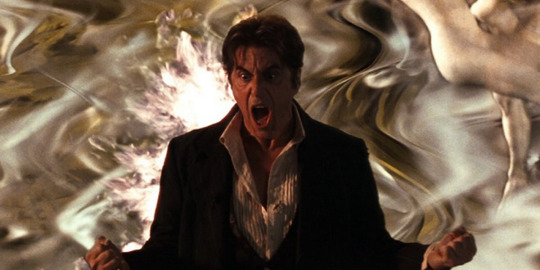
Several years before facing Peter Stormare’s Lucifer in “Constantine,” Keanu Reeves had to challenge the Prince of Darkness in the 1997 crime/horror combo “The Devil’s Advocate.” In the film, Reeves plays Kevin Lomax, an up-and-coming lawyer working in Florida. Lomax is not necessarily an evil man, but he is a highly ambitious one, and is both dedicated and skilled when it comes to his job: even when defending a client he realizes is guilty, Lomax is still able to find a way to gain an acquittal from the jury. He’s a man who refuses to lose a case, no matter what. Indeed, his incredible ability to help his clients gets him the attention of a prominent law firm in New York City. Kevin accepts their job offer and moves to New York with his wife, Mary Ann (played by future Evil Queen and Morticia, Charlize Theron), expecting big things from this change in his life…and he certainly gets them, thought not at all the way he expects. The head of the firm is Al Pacino’s character, who goes by the name of “John Milton.” (A reference to the writer of “Paradise Lost.”) At first, Lomax and Milton get on swimmingly, but over time, as Kevin’s life begins to fall apart – his wife going insane, his career taking nightmarish directions – he begins to realize more and more that Milton is not all he seems. It’s ultimately revealed that Milton is not only Kevin’s long-lost father…but, more importantly, that Milton is the Devil himself. Milton’s whole scheme is to force Kevin into a position where he will willingly become the father of the Antichrist, so that Milton can – of course – take over the world. While Pacino was always the first choice to play the Devil in this movie, the creators didn’t secure his performance right away. Apparently, Pacino initially felt the role of Milton was too one-note, and rejected earlier versions of the script no less than three times. He did recommend other actors who might be able to take the part – apparently, both Sean Connery and Robert Redford, of all people, were considered for the role, per Pacino’s suggestion – but these performers ended up being either unavailable or simply unwilling to tackle the character. Finally, on the fourth proposal - and with some changes made to the script by that point – Pacino accepted the part. Thank goodness (or badness, I guess, in this case), because it’s hard to imagine anyone but ol’ Scarface here doing such a great job with the portrayal of the Devil in the film. Pacino’s Devil is a wonderfully fun villain; he’s somehow a character who hides nothing and yet remains an eternal enigma. Much like Jack Nicholson’s Daryl Van Horne, there’s a mixture of coarseness and dignity to this take on the concept. Pacino swaggers through the role, and carries himself with…basically the exact kind of attitude you’d EXPECT Pacino as the Devil to have: he's somewhere between a gangster and a sleazy snake oil salesman. It’s Pacino at his most…Pacino-y, but he also has a strength and sense of uneasy menace to him that gives him the power and believability a part like this requires. He speaks so sensibly and makes many good and interesting points, yet at the same time he never hides the fact that…well…he is who and what he is. To me, when I think of the Devil, this is one of the first versions I think of, and it’s easily in my Top 3 of Pacino’s performances (my favorite is Michael Corleone, my second favorite is Tony Montana). All in all, an easy choice for high placement on this countdown. Also…Keanu, you should probably stop ticking off the Devil. It, uh…doesn’t seem to go well for you, whenever it happens. Plus, now you have both Michael and Dracula mad at you, so…(pauses)…oh, who am I kidding, he’s John Wick. He can take care of himself. :P Tomorrow, the countdown continues with Number 6! HINT: One…Two…Three Strikes, You’re Out!
#the devils i know#top 31 devils#fiction#list#countdown#best#favorites#halloween advent calendar#october special#number 7#films#movies#actors#acting#al pacino#john milton#satan#the devil's advocate
16 notes
·
View notes
Text
spike, angel, buffy & romanticism: part 4
part 1: “When you kiss me I want to die”: Angel and the high school seasons
part 2: “Love isn’t brains, children”: Enter Spike as the id
part 3: “Something effulgent”: Season five and the construction of Spike the romantic
*
“But I can’t fool myself. Or Spike, for some reason.”: Buffy and Spike as a blended self
Before I get into seasons six and seven, it’s worth asking: why would the show do all of this? Why would it spend all of this time developing a supporting villain and joke id character? Why would it give him a romantic arc? I see people say that the writers only gave Spike these storylines because he was popular or they wanted to keep him around, but even that being the case, there was no need to give him the specific arc that they did. It’s more than possible to read meaning into the story that they chose from the array of possible options.
Here is the thing about the id. It’s not actually something separate from you. It’s not a ravenous monster you can blame your weaknesses on while remaining pure and dignified. The id is part of you. The immediate and enduring appeal of Spike is, I suspect, strongly influenced by the fact that the things the id wants are so very human and sympathetic. His foibles and mistakes are often painfully familiar, even exaggerated through vampirism as they are. In fact, it’s precisely because Spike is allowed to show a full range of reactions to love, because the writing is under less pressure for him to do the “right” or dignified thing, that he can at times be compelling in ways other characters can’t. If Spike just did nasty things, his appeal wouldn’t be much more complicated than the appeal of Angelus, who people tend to like as a villain or storyline rather than as a relatable character. But Spike doesn’t want to dismember nuns or construct elaborate murder tableaux. He wants familiar things like love, identity and meaning, even if the ways he goes about getting them can reflect people’s worst impulses.
Which brings us to Buffy, and Buffy’s story about growing up. Buffy is Buffy’s show, which means that every writing choice tends to revolve around her arc in one way or another. And this goes for Spike’s storyline even more than most. In the final three seasons of the show, the writing finally engages with how inextricable the id--and all of its impulsive, inarticulate romantic desires--really is from a person’s self. So instead of keeping Spike at a comfortable distance, both Buffy and the writing begin to take him seriously. They begin to invite him in.
Starting in season five, it’s telling how frequently Buffy herself projects on Spike, rather than just the writing setting them up as mirrors. She tells him that he’s the “only one strong enough” to protect her family, and later assigns Dawn specifically to his protection. In “Spiral” she describes him as “the only one besides me that has any chance of protecting Dawn.” This is a very intimate role that she otherwise only assigns to herself (and which is not really based on pure practicality, considering that she’ll later describe Willow as her “big gun”--yet never gives Willow the task of protecting Dawn). She tells him that he cannot love, which is the thing she fears most about herself. Her protests that Spike is a vampire, and thus cannot express or want human things like love, mirror her lamentations that as the Slayer, she cannot have a normal life.
From the Gilliland Gothic double essay:
More than any of her other lovers, Buffy and Spike overlap one another so often that at times their character arcs become nearly indistinguishable. With Angel, Buffy traveled a parallel path in attempting to master self-control. With Riley, her journey ultimately took her in the opposite direction. With Spike, Buffy’s journey is most closely shadowed, in that her interactions with him in many ways can be seen as metaphors for her feelings about herself.
So now Spike is multiple things. On the one hand, he’s the soulless id he’s been since season two. His vampiric behavior represents a morally uninhibited way of reacting to romantic frustrations, among other things. But on the other hand, his vampirism now also marks him as like Buffy, not merely her opposite.* Nor is he only her mirror in the realm of romantic love. The part of him that is a vampire is the part of him that is supernatural (ie, Romantically larger-than-life), that sets him apart from regular people, and dictates how he can and cannot behave. Just like Buffy’s slayerness. His vampirism is what makes him capable of protecting Dawn, while also making him (supposedly, according to Buffy) incapable of human feeling--again, just like Buffy’s slayerness. Instead of Buffy’s Slayer side being aligned with Angelus, who was an unmitigated evil, it becomes aligned with Spike, who is something more complicated.
*(Though it must be noted that this was a process that began in season four, with the show aligning Spike with the Scoobies by making him a victim of the Initiative. Spike being supernatural suddenly marks him as non-normative, just like the Scoobies, in contrast to the institutional conformity that the Initiative represents. The evolution towards treating the Romantic supernatural as something positive and associated with identity plays a key role in transitioning the show to the more complicated attitudes of the last three seasons.)
This shift in the show’s attitudes towards the id affects how Spike is used. In “Blood Ties” for example, Spike assists Dawn in breaking into the Magic Shop and in “Forever” he helps Dawn resurrect her and Buffy’s mother. In both cases, Spike could be read as embodying impulsive behavior that Buffy is supposed to be better than. Yet both cases specifically involve Spike helping Dawn, who is repeatedly portrayed as Buffy’s human side. As Buffy says in “The Gift”: “[Dawn]’s more than [my sister]. She’s me. The monks made her out of me. [...] Dawn is a part of me. The only part that I--”. In other words, Buffy’s id becomes closely tied to her humanity, even going so far as to become its safeguard. “Blood Ties” ends with Buffy affirming her connection to Dawn, which Spike’s rule-breaking directly enabled, and “Forever” ends with Buffy acknowledging how desperately she wants her mother back too, and becoming closer to Dawn as a result. (Compare to “Lovers Walk”, where Buffy acknowledging her id results in her breaking away from Angel, not drawing closer to anyone). Or in “Intervention”, Spike building the Buffybot directly parallels Buffy’s own anxieties about what she thinks she should be. She thinks she’s losing her ability to love, and that effusive fakery is her only recourse (as she said in “I Was Made to Love You”: “Maybe I could change. [...] I could spend less time slaying, I could laugh at his jokes. I mean men like that right? The joke laughing at?”), a fear that even has some merit, given that her friends cannot tell her and the bot apart. Instead of Buffy and Spike having separate arcs in the episode, Spike learning the difference between real and fake dovetails with Buffy’s own relationship to her realness and fakeness. It turns out that neither of them want a bot version of Buffy. They want real emotion, things like sacrifice and heartfelt gratitude. If even Buffy’s id would let itself be killed for Dawn, then maybe she has nothing to fear from herself. Maybe there is some beauty in the emotional part of her nature that she thinks she must repress.
In other words, part of the writing (and Buffy) fully engaging with romanticism and the id, means engaging with the ways they can be bad and good. There’s this weird thing that happens with Spike as soon as he falls in love with Buffy, where suddenly his actions are more uncomfortable, and to many, off-putting, because their object is Buffy (instead of another vampire like Harmony or Drusilla, who either enjoy the same vampiric things he does, or the audience might be inclined to see as a moral nonentity regardless). His comic id quality becomes somewhat darker and more serious, almost like the way Angel’s early season two darkness becomes more serious after he loses his soul. But at the same time, Spike’s actions are also more intriguing, sympathetic, and even noble...because their object is Buffy. It makes no sense that a soulless vampire should not only fall in love with the Slayer, but genuinely attempt to transform himself into someone worthy of her love. And yet that’s exactly what Buffy inspires him to do. By loving Buffy Spike’s dual nature, and the dual nature of his romanticism, is thrown into relief: it’s something that can be selfish and creepy, yes, but also something that hints at the idea that real romanticism does exist. Something worth feeling romantically about does exist. Thus the writing can at once criticize, say, the way the chivalric mindset conflates love and suffering, while also suggesting that there are kinds of love it’s worth being transformed by. (Meanwhile, Spike’s fumbling bewilderment over how to love Buffy, and what the rules of loving people correctly even are, creates a human middle ground between monstrousness and heroism). By leaning into the way that Buffy and Spike have been used as mirrors for three seasons, and introducing the mythology-bending idea of Spike being in love with Buffy, the writing is able to fully engage with this complicated, contradictory nature of love and romance.
All of which is to say. Spike becomes a potential love interest, and is given a convoluted inner conflict between monstrousness, humanity and heroism, in precisely the season in which Buffy begins to reckon with her own inner conflict between her darker impulses, her human reality, and her supernatural role. It’s no coincidence that season five opens with Dracula, an icon of romantic vampire mythology, tempting Buffy with darkness and promising her insight into her nature. Or that a vampire kidnaps Dawn--again, her human half--in the next episode. Or that the season’s antagonist is a super-strong blonde woman who wants to destroy Dawn instead of protect her. Or that she says goodbye to Riley, the boyfriend who embodied her hopes for a more normative way of being (notice how Riley is progressively destabilized by everything non-normative about Buffy’s life, and provokes those anxieties Buffy expresses in “I Was Made to Love You”). Over and over in season five, Buffy fears that her Slayer half is cold, destructive, and otherwise dangerous. That these Romantic things like gods and vampires have it in for Buffy’s vulnerable humanity. Yet Buffy’s vampire id simultaneously gives lie to these fears by proving itself capable of heroism and genuine human feeling.
In other words, Spike becomes a potential love interest in a season that treats the Romantic--ie the grand and mythical--as something more than just an attractive lie to be disabused of. Rather, the question that season five seems to posit to me, and which will not be fully answered until the end of season seven, is this: once you do clear away the attractive lies, once you accept the hard realities, once you’ve seen the darkest underbellies, what are the things that are left that are truly grand and beautiful? What are the stories that are really worth telling, and the heroes that are really worth having?
And the show asks and answers these questions on both a very personal level, and a more meta, systemic level. On the personal level, Buffy and Spike are forced to confront their illusions not just about the world, but about themselves. They are made to ask themselves what constitutes a heroic role or a demonic weakness, versus basic, unromantic humanity. And on the meta level, the show asks questions about our expectations for how both love stories and chosen hero stories are supposed to go.
part 5: “Everything used to be so clear”: Season six and the agony of the real
163 notes
·
View notes
Note
How do you feel about adding Serge from Megalopolis to your roundup? (Personally, I'm not going super crazy over the pics and the little bit I've read about his character, but I suppose it'll depend on how he's revealed in the movie.)
Hi and thank you for your message!
I was seriously excited when the Megalopolis news dropped. Francis Ford Coppola made the sexiest Dracula movie ever and even managed to make Gary Oldman kind of hot! I assumed he would make AD smoldering hot! I even read the script myself and although I wasn’t blown away, I thought it could be fun and had potential. I even like the name Serge. And I definitely love and prefer anti-heroes, villains, and bastards!
It was a bad day for me when those pics of that absolutely hideous hair dropped. Omg I was and am so pissed about it! What a fucking travesty to butcher AD’s hair like that - a man who has some of the best hair out there. It’s criminal. It’s like one of my best friends has said — Paul Giamatti exists and he’s a superb actor, so if you want someone who looks fugly but can act, get someone who’s fugly and can act! Don’t get one of the hottest men in the world and turn him into Paul Giamatti!
I personally only like men with good hair that is at least on the longer side and facial hair, both in actors and in real life. Almost without exception, short hair and clean shaven is a no-fly zone for me, along with blondes, redheads, and small men 🤣 There are exceptions, of course! But the super short Serge cut is an absolute turnoff for me. I just can’t. There is nothing he could do to redeem himself into being attractive to me short of getting a makeover. I might like the movie and the character, that remains to be seen, and I actually assume I might. But he’s very very unattractive to me. Like White Noise, I actually liked the movie quite a lot, but I’m very not into Jack as an object of attraction lol. If anyone else is into them, that’s awesome and more power to you! But it’s not my thing.
I’m so so happy for and excited by 65! I’m absolutely adding Mills to my lineup and I already have a couple things in the works for him and a bigger story planned. I’m also working on a fun AU for one of my friends who made an AD edit that looks like Cruella DeVille and asked for a thing with him 🤣 After 65 though, it looks like I’m in for a long drought of characters I find hot and am excited by.
As of January 1, I dropped Clyde, Henry, and Charlie from my lineup because I’m just so much more into Jacques and Flip, and I know I’m going to be obsessed with Mills. For the foreseeable future, I’ll be keeping my lineup to them and Kylo AUs. I’ll have my plate full with those four for anything I try to write this year. I also just enjoy writing them the most. And some other guys may show up for cameos here and there or as specials for friends!
My lineup was starting to look like this for a while 🤣

I’ve really been losing steam with the fic business just because it seems like there are much more meaningful and productive things I could and should be doing with my time. I have a novel I’m finishing and another crank out this year, so those definitely take priority, but I’ve generally enjoyed splitting it up with fics. I’ve literally written over a million words in fiction since 2020, and I go back and forth as to whether or not its been worth it or just a pathetic waste of time and cry for help 🤣 It feels like throwing it out into a void a lot of the time. However, at least it’s been good practice, which is why I’ve kept it up!
If you are into or get into Serge, I’m sure there will be plenty of fics out there for him! I expect him to be one of the more popular guys in fics going forward. If you get into Mills, I’ll definitely be your guy for him!
Sorry, that was an overly long-winded answer to your question! Talk about obnoxiously over-sharing 🤣
3 notes
·
View notes
Text
Female characters in retro shojo [70s edition, part 1]
Ah, the 1970s (and early 80s), where a majority of the shojo manga stories took place in a distant European country or in America, surrounding either orphan girls from the 19th or early 20th century, who remain cheerful and have adventures, trying to find out who they are, making friends and falling in love, or epic historical stories filled with war, scandals and larger than life characters. If the manga was taking place in Japan, the plot was somehow more down to earth -though most of the time it restrained the same amount of unrealism- and it was either about following the journey of a girl who pursues the career of her dreams and evolves into a notable person, or a high school story filled either with melodrama and angst or a more heartwarming romantic comedy. But in this two-part article I won’t talk about plot tropes of the shojo manga of that era -as this topic deserves an exclusive article-, but about the female characters (I will dedicate an article on male characters some other time). Those characters are very important, as they set the standards of today’s manga and anime. But it should be noted that back then the formula of their design and characteristics are different from today’s. Those are the categories that I’ve noticed, regarding the appearance and personality.
The “average” protagonists
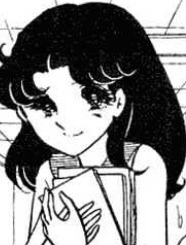

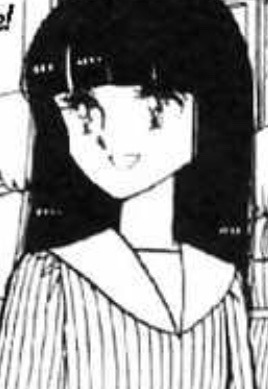
They are the most common category. Usually, they come from middle class and they are presented either as cheerful and a little dense schoolgirls, or plain looking and unrefined, as oppose to their antagonists or rivals who are well educated, beautiful and more talented, but this may serve as a determination for them to improve. Other times they are presented as headstrong heroines, ahead of their time, who refuse to compromise and for this they are a pain to their old-fashion society. Either way, they are kind, good, well-intentioned and want to help the others, that’s why they make friends easily. The thing that really works with these characters and makes them much more interesting than they may seem, is that they are independent and built their future on their own and they never give up, no matter what happens and what someone might say about them. Even when they are not sure of themselves, they always keep trying, until they reach to their dream. They use their obstacles as strength and determination to go on, proving that they are not average at all.
Maya, the protagonist of “Glass Mask” is a great example of this. She starts as a good-for-nothing daughter of a poor family, who isn’t particularly accomplished, but has a hidden passion for acting which she hadn’t realise it herself at that point. But when she is discovered by Tsukigake, a former legendary actress, she realises how much she wants to be an actress to a point that she lied saying that her mother allowed her to study to sensei’s acting school and ran away from home. Not even when her mother told her that she doesn’t consider her as her daughter anymore, she didn’t gave up, in spite of being very hurt by this. Her path towards acting wasn’t easy. Many times she has to face many who say that she doesn’t belong to that industry, or who are jealous of her talent and means her harm, but with her faith in herself, she always overcomes those obstacles. An admirable thing about her is that she dislikes fame, being shy, as she just wants to act and that she does not gives up, no matter what and even when she does, she quickly stands up. The most interesting dynamic of the story is her worthy rivalry with Ayumi, that is clearly a case of the trope “technician vs performer”, with Maya as the performer, as her standard method to learn how to play a character is to become that character. As the story progresses, Maya evolves from a girl with a hidden talent, to a young actress who portraits an original take to classic characters, but who still had much to learn, to one of the greatest actresses of her generation.
In “Yokohama Monogatari”, Uno starts as a plain, poor, orphan girl, who is ignorant about the world, as she hasn’t even seen the sea before and she believed that westerners were vampires who could drink people’s blood, that’s why they had blonde hair and blue eyes. She starts to work as a companion in a rich family to their daughter Mariko, who is the same age as her. Besides their differences, they become quickly best friends. While Mariko is a little spoiled, Uno, despite of her ignorance of world, can be more considerate and responsible in some matters. She also has a lust for learning and soon her and Mariko pursuade her family to go to school. There, she meets many people, among them there are a few foreigners too, she makes a lot of friends, and she excels at all of her studies, being hardworking. As the years passed by, Japan changes and allows exchange of ideas from many cultures -it’s Meiji era we are taking about, that means the last quarter of the 19th century- and Uno evolves from a poor, -many would say- hopeless for her situation, clueless of the world girl, to an open minded, educated and refined woman, surrounded by many people she loves.
In “Tokimeki Tonight”, Ranze -well except of being the daughter of Dracula and warewolf and having her own vampire powers as well- is an average girl who is friendly, sweet and little quirky girl who goes to school and falls in love with Shuun. Some may say that she is pretty basic, but in fact, she knows her self worth well, so even when her parents were disappointed with her not having any power yet, at the beginning of the story, she wasn’t particularly bothered by it. Also she is very headstrong that she falls in love with a human boy, while she knows well that a creature from the demon world and a human cannot be together. But in spite of all of that, she decides to stay true to her own feelings and even though she’s not so sure about Shuun’s feelings for her either, she doesn’t give up and waits for him, because she hopes and deep down knows that he likes her too and she is right. And even when her parents want her to marry prince Aaron of the demon world and even the king- learn that she likes a human, in spite of that being against the rules, she isn’t afraid to stand up for her beliefs. Later though, we learn that Shuun is the lost prince of the demon world, so he is not a human after all, but that’s another story.
In “Aim For The Ace”, Hiromi is a typical schoolgirl who struggles to get better in tennis, when she gets selected as one of the club’s main players in school by the new coach, as he saw potential in her. Some of her seniors are jealous of her because of that and at first she thinks that she is not worth such a discrimination, but soon she improves and realises how much she loves tennis. There’s also a very similar rivalry dynamic with “glass mask” between Hiromi and Reika who grow to be worthy opponents.
In “Haikara San Ga Toru”, Benio is a headstrong young woman who studies Kendo, drinks sake and prefers reading literature and feminist ideas, rather than being interested in housework. She also likes to dress in western clothes, rather than the traditional kimono and strongly believes that women should have the right to decide for their future on their own and they should marry for love. But her world turns upside down when her father announces that he has arranged a marriage for her. The one that he indends for her is someone she knew before, very briefly and accidentally, a lieutenant named Shinobu. Of course, she refuses, being loyal to her ideals and she goes out of her way to avoid him, just to satisfy her pride, in spite of actually starting developing feelings for him. When she moves to his grandparents’ house to get prepared as his wife, she purposely fails in all of her duties as a housewife and constantly argues with his grandparents, but all of that only makes Shinobu fall for her even more. It’s only when he leaves to go to the war, when she realises her feelings for him and during at that time when everyone thought that he was dead, she matured and became even stronger, remaining loyal to him and determined to work as a journalist to support his family, but also tracking him down, hoping that he’s still alive. Of course, at the very end, they live happily ever after together. Benio’s character development is admirable; starting as a clever, but headstrong girl, to an independent and wise woman, proving that you don’t have to disagree with everyone in order to prove that you are the one who chooses how to live your own life.
The villains
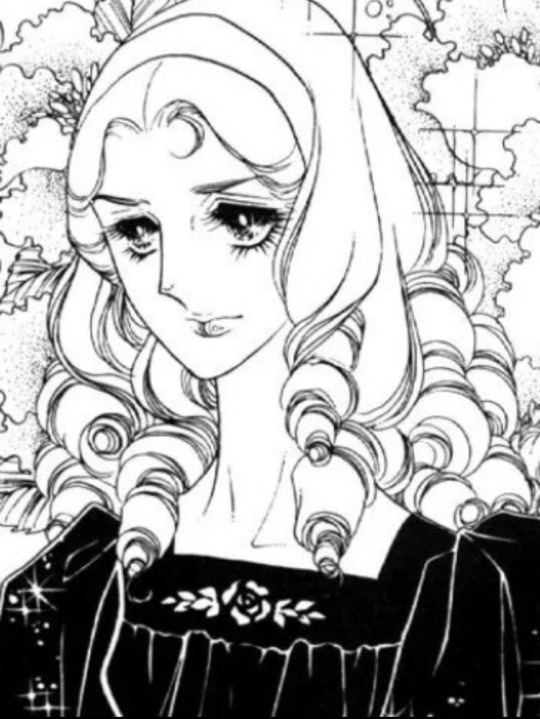
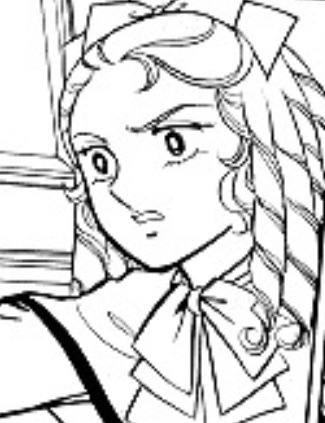
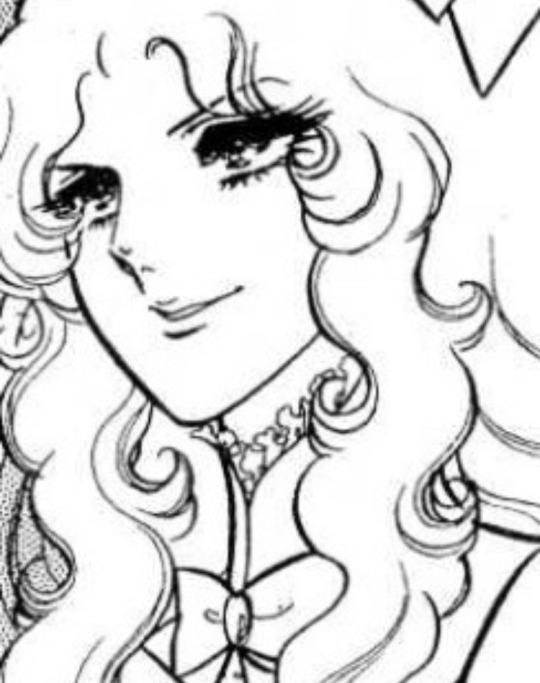
Their extreme pride and vain is their common nature. Most of the times they come from a wealthy family, so they are either oujo-sans who are always dressed elegantly, are seemingly refined and they tend to have curly, blonde hair -as blonde hair seem to be associated with wealth and sophistication in Japan-, or they are just spoiled brats that demand that everyone will do as they say. They are the main antagonist of the story for different reasons. The most common one is that they are jealous of the heroine, either because they are their love rivals and they are jealous of the heroine’s relationship with the love interest of the story, or because they are just pathologically jealous of the heroine because of her looks, her happiness, her luck and her loving nature. Another reason they act the way they do is because they want power and success, or they just want to secure all of that. The worse and least complex reason of all is that they are just mean for no particular reason.
Eliza, from “Candy Candy” is the typical alpha b*tch who is pathologically jealous of Candy. At first, she along with her brother, makes her life miserable, by blaming her for the bad things they do, such as hurting the horses in the stables, provoking her and then telling to their mother that she’s wild and leaving her alone in a town she doesn’t know and locking her in dark rooms. After that, during their time in London, Eliza says to everyone that Candy is an orphan who made her life miserable, even blaming her for Antony’s death. Later, having the habit of falling in love with the one that Candy likes too, school, she falls for Terry and constantly tries to turn him against her, failing miserably. She also writes a fake letter to her that it was supposedly from Terry and to Terry too, to meet each other in the stables at night and with this, she blabs them to the teachers and Candy, having no choice, leaves school. Later, when Candy was pursuing a career as a nurse, she continues her cruel ways and her mother also threats the director of the hospital where she was working, that if they won’t fire her, the Leagan family will withdraw their funds for the hospital and she also made sure that no hospital from Chicago will hire her, leaving Candy in a difficult situation. Those are only of few of the things that Leagan family did to Candy. The worst part is that they don’t pay for what they did at the end.
Fukiko from “Oniisama e” fits well this image; She is a refined lady from a rich family, the president of the sorority and very educated, that’s why she is admired by everyone. However, in reality she is manipulative, proud and very possessive. She wants to control everyone and she’s even willing to go out of her way to achieve what she wants. For instanse, she’s jealous of Nanako because she is close to Henmi Takehito, the one that she (Fukiko) is in love with, so to control her, she chooses her to be a member of the sorority and demands that she will stay away from him, even by pulling her into the lake and attempt to drown her . She also makes Rei’s life miserable, by stepping into her weakness, refuse to accept her as a member of their family and constantly manipulating her with the cruelest of ways. Also, it’s revealed that her friends from the sorority are feeling pressured because of her. Later, with the death of Rei, along with her realisation that Henmi and Kaoru No Kimi are truly in love, surprisingly, she regrets, gives up on her cruel ways and matures, growing even more beautiful for all of that.
Yoko from “Tokimeki Tonight” is a different case. She is the love rival of the story and the have loved Shuun ever since they were little. Being the only daughter of a rich businessman, she is spoiled and when something doesn’t go as she wants, she is is angry and demands that everything will go the way she wants. She envies Ranze for her close relationship with Makabe and ever since she accidentally saw her transforming, she tried desperately to prove others that she (Ranze) is a vampire. Her character is less dramatic and more comedic, as she is often grumpy and clumsy. But she isn’t really a bad person and she doesn’t really cause an awful lot of trouble.
In “The Rose of Versailles”, Madam Du Barry, the king’s mistress, wants to sustain her place in the court and demands that Marie Antoinette, who was at that time the dauphine, will speak to her. She also have tried to poison one of the court ladies. Countess De polignag becomes the queen’s best friend, for her own benefits and manipulates her without her (Marie Antoinette) knowing, like telling her to lie about being pregnant and also persuade her to start gambling in the court, which was illegal. She’s also Rosalie’s biological mother and accidentally kills the woman which raised her daughter and she’s the reason that her other daughter suicides, because she cannot handle the marriage the she arranged for her. Besides of her daughter’s death, she doesn’t seem to regret for any of her actions as she tries to make Rosalie merry the same man. Luckily Rosalie escapes. Also, she tried to sabotage Oscar many times and all this was just for the sake of power and money.
In “Glass Mask”, Norie Otobe, befriends Maya and she is supposedly her assistant, but in reality she just waits for the right moment to strike and steal Maya’s role and career. Unfortunately, she succeeds and it costs a lot for Maya, for a while. Luckily Ayumi discovers this and punishes her with the best way ever.
The tomboys
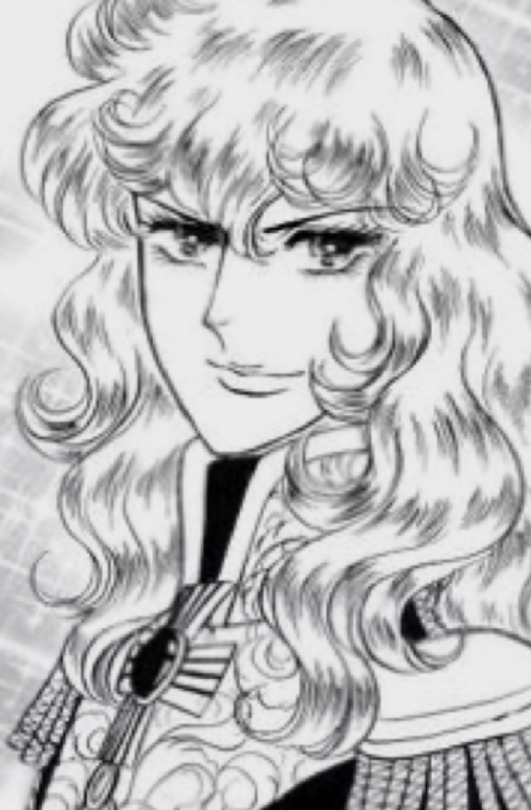
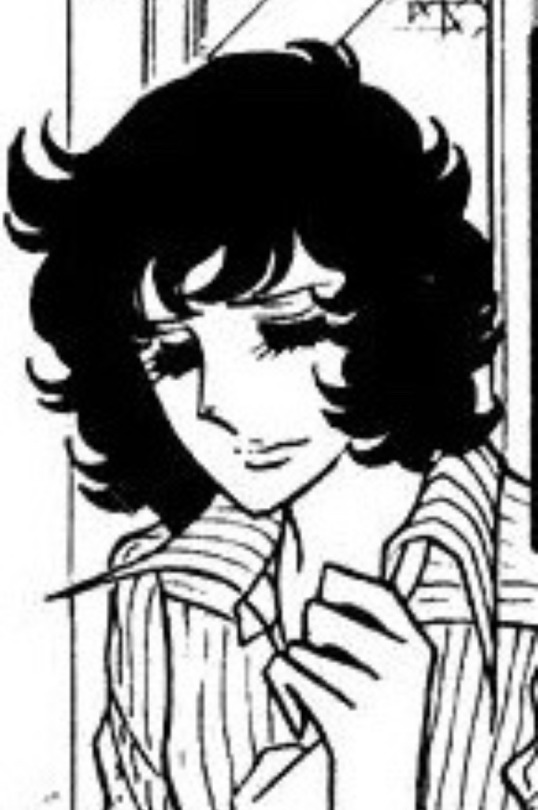
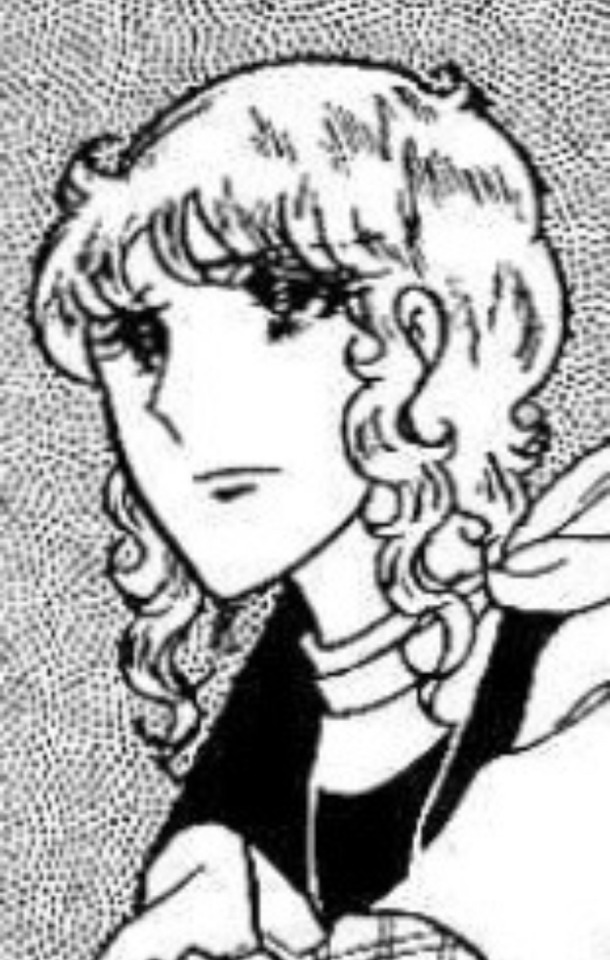
They are either mysterious, or lively, but one thing is for sure; they are dressed in clothes that are considered to be “manly”, they are handsome and they are constantly mistaken for a boy. They are also very elegant and educated and their image is that of a prince. That’s why they are admired by both women and men. Some may say that even though they are trying to be like a man, they are still weak, but they point out that just because they dress more “tomboyish”, doesn’t mean that it makes them less of a woman. After all, when they want to, they can transform into the most feminine girl of all. They also prove that their sexuality is not associated with their looks, as a “masculine” girl has the same possibilities of being heterosexual or homosexual, with a more “feminine” one. So, they break all the stereotypes regarding women. Many times, they are portrayed as headstrong heroines who stand up for their beliefs and their friends.
The most famous character that supports this image is Oscar from “the Rose of Versailles”. Oscar is one of the daughters of the Jerjeyes household. Not having any son, her father decided to raise her as a boy so that one day she will succeed him. Oscar dresses in boys’ clothes and learns activities like fencing and archery. When she was fourteen, she was tasked to serve as Marie Antoinette’s bodyguard. The manga often pointed out how different those two were regarding appearance and character, even if they were in the same age. Oscar has a strong sense of justice and she always protects the weak and is not afraid to challenge someone that she believes that isn’t right. Of course, she is admired by men and women alike and she is also a great and loyal friend. At one point she falls in love with Fersen, who loves Marie Antoinette. But because of her respect for the queen and her love of Fersen, she helps them, despite being heartbroken. At the end, she realises that she loves her childhood friend, Andre. She loves medieval combat, drinking heavy drinks, talking about politics and playing violin. Many pointed out that being a woman she was weaker but she always proved them wrong, pointing out that women can do anything and that it doesn’t matter if you are a man or a woman, only how skilful you are. She was hiding her femininity not because she wanted to be a man, but because that if she acted like a woman, the society might think that she was weak and she wouldn’t be able to have the access and the freedom to do what women normally wouldn’t do back then, because women were alowed to limited things. In the early 1970s, by the time this manga was ongoing, the second wave of feminism had already started and women started fighting for equal legal and social rights, so Oscar’s character was influenced by all this.
Rei from “Oniisama e”, is admired by her fellow classmates and is also called “saint Juste”, named after one of the leaders from French Revolution, due to her physical resemblance to him. She is very charismatic, excelling to sports, piano, guitar and theatre, she is very elegant and dresses often in a black suit. Unfortunately she is drug-addict, she smokes and can be suicidal, carrying always pills and a sharp object with her. She is also obsessed with Fukiko, the sorority’s president, for many reasons, causing her to be controlled and abused by her. She also lives alone in a depressing house filled with mirrors and this also causes to be depressed. Her best friend is Kaoru no Kimi, who’s also a tomboy, but they are entirely different and she befriends Nanako and her friends. In the end she suicides, taking too many sleeping pills, having everyone, especially Nanako, left devastated.
Also from “Oniisama e”, Kaoru, is a tomboy who is strong and energetic. She is athletic and excels at basketball, but she is also very cool and doesn’t seem to care that she is the best at something that she’s doing, that’s why she is admired by her fellow classmates who gave her the nickname “Kaoru no Kimi”, from a Japanese classical novel; “the tale of Genji”. She also has a great sense of justice, as when she sees classmates being bullied, she defends them and put the bullies on their place. She is also very loyal and supportive and cares deeply about her friends, helping them when they are in need, especially her best friend, Rei, for whom she is very concerned. But in spite of her energetic appearance, she suffers from breast cancer and tries to keep it a secret, pretending that she is healthy and that everything is under control. But in fact, she pushes away her beloved, Henmi Takehito, concealing her true feelings, in order for him to be happy without her and not suffer anymore, showing how selfless she is and how much she loves him to a point of sacrificing her own feelings. At the end, it pays off and they end up together, living happily.
Another honourable mention is Rei, from “Glass Mask”. Rei is the older student of Tsukikage sensei’s company and one of Maya’s best friends. She is a tomboy who wears those characteristic 70s jeans and for some reason is mistaken by a boy -much to her dislike-, despite of being obvious that she is a girl. Being an actress, she can transform into a beautiful princess in no time, but she also portraits very well a prince. In the first volumes, she portrayed Jo, from “little women” which was a role very suited for her. As a sister figure for Maya, she is loyal, friendly and the responsible one who helps the theatre company stay organised and is a very strict teacher to Maya, helping her because she knows her potential. Also from “Glass Mask”, Keiko from the “Ikkakuju group” is also mistaken as boy, but she can transform into a pretty princess in no time.
Note: At the first half of the 20th century “Little Women” were very popular in Japan, particularly Jo, who was tomboyish and outspoken and her character had inspired the first female mangakas of the 60s for their stories and characters.
#retro shojo#shojo manga#70s manga#80s manga#glass mask#Tokimeki tonight#haikara san ga tooru#Oniisama e#the Rose of Versailles#Candy Candy#Yokohama monogatari#aim for the ace#character types#Shojo
240 notes
·
View notes
Text
You're Being Awfully Presumptuous
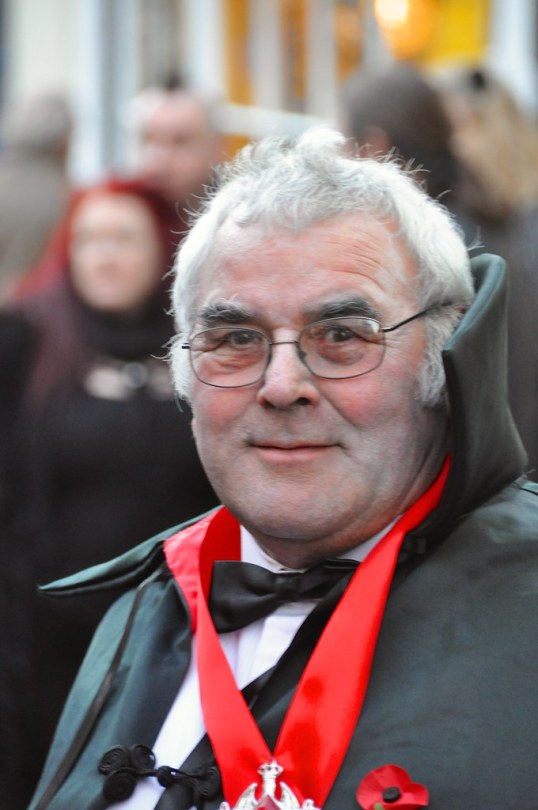
Your neighbor is a vampire. It's the only thing that makes any sense. First, he dresses EXACTLY like Dracula, all the time, even when alone in the house. Second, you never see him in the day, only at night. And third, even though he has a kitchen, you've never seen him eat, and even though he has a bathroom, you never see him use it.
You learned all these things over the past few weeks, shortly after getting a telescope for your birthday. You've been watching him, every so often, through his windows. It's how you discovered his peculiarities. It kind of scares you, really, but you keep watching, night after night. Sometimes he's on the couch in the living room, reading a book. Sometimes he's playing the piano he has in the upstairs hall. Sometimes he puts on a record and dances like no one's watching, even though someone is watching. But anything to do with normal human functions? Eating, drinking, going to the bathroom? Nowhere to be found.
Weeks go by. You reach the limit of what can be learned by peeking from afar. So you break into his house one Saturday morning, throwing a rock through a window and loosening the bolt. You look into his fridge, and there's no food, but there are stacks and stacks of bags filled with a dark red liquid. It's blood. You look around some more. You realize there's no mirrors anywhere. Finally you get to a closed door upstairs. You push it open and see, pressed up against the wall and resting on a large block, a coffin. You creep over and gently lift the lid. Inside is your neighbor, with a trickle of blood running down his mouth. Up close you can see his two sharp fangs protruding over his lip. It's confirmed. Definitely a vampire. Only one thing to do.

( "Wooden Stake #2" by aneye4apicture is licensed under CC BY-NC-ND 2.0. ) You go back downstairs and smash one of the chairs in the kitchen, made from a heavy pine wood. You'd think the noise would wake someone, but the vampire remained fast asleep. You take one of the legs and, with a knife from the counter, sharpen it to a point. Finally, you grab a meat tenderizer from one of the drawers and go back upstairs, on to the coffin room.
You lift the lid, place the stake, and pound down the hammer. Your neighbor wakes up, screams, then crumbles to dust right there. You did it. You killed the vampire. And it wasn't even that hard. You go home, feeling very proud of yourself.
Until later that night, when the police show up at your house. They say they have a warrant for your arrest, for breaking into your neighbor's house and killing him. But, you say, he was a vampire. And the police say yes he was, but that doesn't mean you can just kill him like that. You're impressed by how casually they agreed he was a vampire, but distressed by them believing what you did was murder.
Later, at your trial, you learn that, yes, your neighbor was indeed a vampire. A vampire who sponsored the town's youth sports league. A vampire who taught adult literacy classes at the local community college. A vampire who let people use his lawn in the summer for free movie nights. A vampire, in other words, who cared. And then, the prosecutor says pointing at you, this villain over here broke into his house, destroyed his furniture, and killed him without mercy. And doesn't even feel sorry about it! What crime, the prosecutor asks, did this vampire commit? Was he bothering anyone? Hurting anyone? Doing anything to deserve a stake through the heart? He. Was. Not.

Your own lawyer argues that all vampires must drink blood to survive and so he had to have been a monster. But then you learn that he actually bought his blood from a blood bank like any respectable vampire would. And then your lawyer actually says “well I got nothing then” and sits down and that's the end of that. The jury doesn't take long at all. In just a few minutes they come back and say they find you guilty.
You spend the rest of your life feeling like you should have thought things through a little more.
Instagram Twitter
3 notes
·
View notes